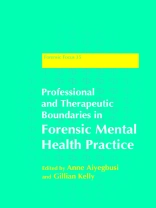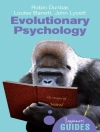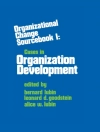People who use forensic mental health services are defined by the fact that they have violated boundaries, often in many ways. For clinicians employed to work therapeutically with this client group however, the capacity to initiate and maintain boundaries is critical to safety as well as to good treatment outcomes.
This book provides a thorough introduction to the subject of professional and therapeutic boundaries and their particular complexities within forensic mental health settings. The contributors, all experts in their respective fields, address the challenges of establishing working boundaries within forensic mental health services from multiple perspectives. They explore the ways in which boundaries can be initiated and maintained in different areas of forensic mental health work, including in psychotherapy, mental health nursing, arts therapies, forensic psychiatry and family therapy, and when working with different client groups, including children and adolescents, offenders with severe personality disorders in high security settings and sex offenders. Consideration is also given to boundaries and homicide, maternal boundary violations and boundaries in a forensic learning disability service.
This authoritative, interdisciplinary resource will support all forensic mental health practitioners in this crucial aspect of their work.
Jadual kandungan
Introduction. 1. What the Eye Doesn’t See: Relationships, Boundaries and Forensic Mental Health. Gwen Adshead, Consultant Forensic Psychotherapist, Broadmoor Hospital, UK. 2. The Patient’s Experience of Professional Abuse in the Psychological Therapies. Dawn Devereux, Director of Public Support, Clinic for Boundary Studies, UK. 3. Boundary Violations: Are Transgressing Professionals Beyond Help? Jonathan Coe, Managing Director, Clinic for Boundaries Studies, UK and Glen Gabbard, The Gabbard Centre, Houston, Texas, USA. 4. Therapy in Perversity: Seduction, Destruction and Keeping Balance. David Jones, Consultant Psychotherapist, DSPD Service, East London NHS Foundation Trust, UK. 5. Groupwork for Offence Perpetrators with a History of Boundary Violation in the Hospital Setting. Estelle Moore, Clinical and Forensic Psychiatrist and Chartered Scientist, Broadmoor Hospital, UK and Emma Ramsden, Drama Therapist and Clinical Supervisor, Broadmoor Hospital, UK. 6. Moving with the Patient: Boundary Phenomena in Forensic Dramatherapy. Mario Guarnieri, Psychoanalytic Psychotherapist and Dramatherapist, South London and Maudsley NHS Foundation Trust, UK. 7. Discovering Harmony: Music Therapy in Forensic Settings. Stella Compton Dickinson, Lead Clinical Specialist in Arts Therapies, Rampton Hospital, UK and Dr. Andy Benn, Consultant Clinical Psychologist, Rampton Hospital, UK. 8. Working with Families in Forensic Settings: A Systemic Perspective on Boundaries. Jo Bownas, Family Therapist, WLMHT, UK. 9. Boundaries in Forensic Mental Health Nursing: Set in Stone or Shifting Sands? Gillian Kelly, Consultant Nurse, Women’s Directorate, WLMHT, UK, and Emma Wadey, Consultant Nurse, DSPD, WLMHT, UK. 10. Boundaries and Desire in Forensic Mental Health Nursing. Professor Cindy Peternelj-Taylor, College of Nursing, University of Saskatchewan, Canada. 11. Boundaries and Boundary Violations in the Nurse-Patient Relationship with People Diagnosed with Personality Disorders in DSPD and WEMSS: Some Findings from a Mixed Methods Research Study. Anne Aiyegbusi, Deputy Director of Nursing, Specialist and Forensic Services, West London Mental Health NHS Trust, UK. 12. Boundary Violations in Medium Security. Brian Darnley, Consultant Forensic Psychiatrist, Devon Partnership NHS Trust, UK, David Reiss, Consultant Forensic Psychiatrist, West London Forensic Services, UK and Gabriel Kirtchuck, Consultant Forensic Psychotherapist, West London Forensic Services, UK. 13. Therapeutic Boundaries in Working with Young People in an NHS Secure Adolescent Forensic Unit. Claire Dimond, Consultant Child and Adolescent Psychiatrist, WLMHT, UK and Denise Sullivan, Ward Manager, Wells Unit, Forensic Adolescent Directorate, WLMHT, UK. 14. Boundary Transgressions as a Tool for Reparation within Therapeutic Relationships. Rebecca Neeld, Group Analyst and Lead Nurse, Cassel Hospital, UK and Tom Clarke, Associate Director of Nursing, South West London and St George’s NHS Trust and Honorary Lecturer, Kingston University, UK. 15. Boundaries and Borderline Personality Disorder. Kingsley Norton, Consultant Psychotherapist, WLMHT, UK. 16. Boundaries and Working with Serious Offenders who also have Severe Personality Disorders in a High Secure Setting. Professor Derek Perkins, Consultant Clinical and Forensic Psychologist, Broadmoor Hospital, UK. 17. Mothering on the Edge: Boundary Failures in Maternal Care. Anna Motz, Consultant Clinical and Forensic Psychologist, Oxford and Buckinghamshire Mental Health Trust, UK. 18. Boundary Matters in a Forensic Learning Disability Service. Richard Curen, Consultant Forensic Psychotherapist, Respond, UK. 19. ‘Dangerous Liaisons’: Close Encounters of the Unboundaried Kind. Christopher Scanlon, Consultant Psychotherapist, SLAM, UK and John Adlam, Adult Psychotherapist, SWL&SG, UK. 20. Neither Here nor There, not one Thing or Another: The Use of a Reflective Practice Group to Understand the Distortion of a Boundary. Stephen Mackie, Consultant Forensic Nurse Psychotherapist, Tavistock and Portman NHS Foundation Trust, UK. 21. Boundaries and Homicide. Ronald Doctor, Consultant Psychotherapist, WLMHT, UK and Maggie Mc Alister, Forensic Adult Psychotherapist, WLMHT, UK. References. Index.
Mengenai Pengarang
Dr Anne Aiyegbusi is Deputy Director of Nursing, Specialist and Forensic Services within West London Mental Health NHS Trust. She has worked as a nurse in forensic mental health services for many years and is interested in integrating forensic psychotherapy with the nursing role. Additionally, she is interested in attachment theory and its application within forensic services.












